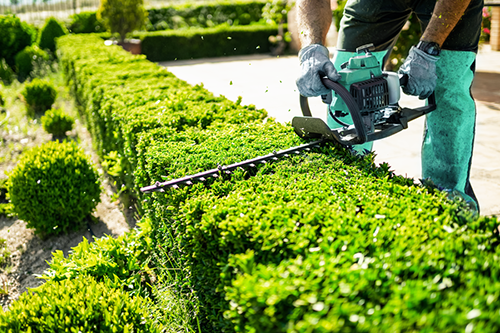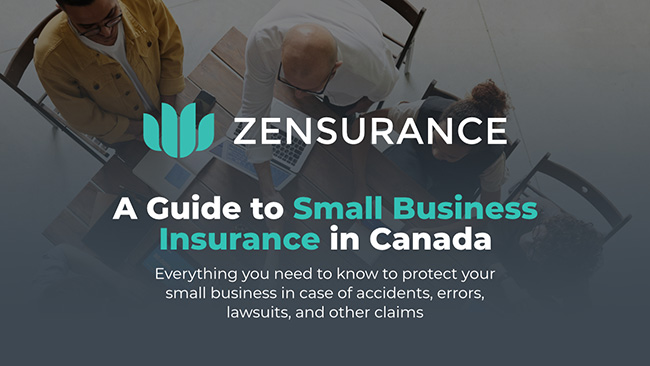It’s been said that the one good thing about wintertime is that snow makes your lawn look as nice as your neighbour’s.
But now it’s spring, a time of plans and projects. Your landscaping and lawn care business is ramping up to service your customers and make their properties lush, trimmed, and tidy.
But before loading that equipment trailer and firing up your lawn mower or trimming hedges at a customer’s property, take some time to ensure your landscaping insurance policy adequately covers the potential risks your business faces.

Download Our FREE Insurance Guide
Learn everything you need to protect your small business.
Whitepaper download
"*" indicates required fields
Your email address will be used by Zensurance to provide latest news, offers and tips.
You can unsubscribe at any time.

Related Posts
Sign Up for ZenMail
"*" indicates required fields
Categories
13 Liability Risks Landscaping and Lawn Care Businesses Face
Although this isn’t a comprehensive list, here are 13 common liability risks landscaping and lawn care professionals and small businesses face that insurance can help:
- Third-party bodily injuries to passersby or property owners.
- Third-party damage to a customer’s or neighbouring property.
- Failing to provide service as agreed upon to a customer or making a mistake that causes them financial loss.
- Sudden and unexpected equipment breakdowns caused by internal mechanical or electrical malfunctions.
- Theft of handheld tools or other equipment from a job site or while in storage.
- Damage to tools and equipment while transporting them from one location to another.
- Auto accidents or collisions involving your business vehicle and trailer.
- Environmental liabilities resulting from exposure to pesticides, herbicides, and other harmful chemicals.
- Inclement weather conditions that damage vehicles and equipment or result in lost work time.
- Working near electrical lines.
- Operating gas-powered machinery like lawnmowers, trimmers, and chainsaws.
- A fire ignites in your office or warehouse, or water damages your storage shed, lawn care equipment, and inventory.
- Theft of equipment, electronics, or vandalism at your landscaping company’s office or storage compound.
Depending on the size and complexity of your landscaping and lawn care business, these and possibly other liability exposures represent risk management blind spots.
Getting a clear view of those liabilities, minimizing them, and having an updated landscaping insurance policy as part of your business continuity plan can help ensure this season is safe and problem-free.
What Does a Landscaping and Lawn Care Insurance Policy Include?
A comprehensive landscaping and lawn care insurance policy typically includes the following coverages:
General Liability Insurance
General liability covers you for third-party bodily injuries and property damages. So, if a passerby trips over a piece of your equipment, falls, and is injured, or while digging a ditch across a customer’s lawn as part of a land makeover, you accidentally cut into the natural gas line leading to the house, general liability insurance can cover the cost of those unfortunate incidents.
Tools and Equipment Insurance
If your tools (hedge trimmers, edgers, hand tools; items below $1,500 in value) or equipment (lawn mowers and items over $1,500) are stolen, vandalized, damaged by a fire, or have water damage, tools and equipment insurance is designed to pay to repair or replace those items.
Pollution Liability Insurance
Pesticides, herbicides, and fertilizers juiced with chemicals to kill insects, prevent weeds, and produce perfect-looking lawns can threaten human health, animals, and the local water supply. Pollution liability insurance can help offset those risks by covering the costs of your business’s environmental liabilities if facing a claim or lawsuit for damage and loss.
Commercial Auto Insurance
Covering damages to the vehicle and equipment trailer you own for shuttling people, materials, and equipment from one customer’s location to another requires commercial auto insurance.
Similar to the coverages in a private-passenger car insurance policy, commercial auto insurance includes statutory coverages every auto policy must have, but with higher coverage limits. Most private-passenger or personal car insurance policies don’t cover the cost of collisions or damages involving a business vehicle.
Commercial Property Insurance
Protecting your office, business contents, inventory, and storage compound from damage or loss caused by fire, water, extreme weather, theft, or vandalism is what commercial property insurance does.
It pays for repairing or replacing your property and contents. Commercial property insurance usually includes business interruption insurance to cover overhead costs following an insurable claim. If it doesn’t, you can add it to your policy.
In general, what your business’s policy should have, its coverage limits, exclusions, and deductibles, depends on the risks you face.
What to Consider When Reviewing Your Landscaping Insurance Policy
When reviewing your landscaping and lawn care insurance or any business insurance policy, there are multiple things to consider to ensure your insurance adequately reflects what’s changed in your business. For example:
- If you purchased new tools and equipment
- If you’re offering new services
- If you’ve hired or intend to hire more employees
- If you are moving to a new office or are renovating your existing commercial property
- If your annual revenue has increased
- If you’re buying a new vehicle or acquiring additional vehicles.
Speak to a licensed Zensurance broker if you are uncertain about what your policy should include or need to review your existing policy to ensure you’re protected.
Tips for Minimizing Landscaping and Lawn Care Business Risks
Beyond updating or purchasing a comprehensive business insurance policy, here are tips to help you minimize some of your business’s risks:
- Regularly inspect and do maintenance on the tools and equipment you use to prevent breakdowns and accidents.
- Ensure all employees are trained to use equipment and tools correctly.
- Ensure all employees wear personal protective equipment (PPE) while working, including hearing protection. Provide them with fresh water, and encourage them to wear sunblock protection.
- Prevent the spread of chemicals used at job sites by ensuring employees remove contaminated clothing and footwear before entering the office or going home.
- If you hire subcontractors, only hire ones carrying liability insurance with a minimum coverage limit of $1 million, sign a contract with them, and ensure a “hold harmless” agreement that benefits your business.
- Test your office’s fire, smoke, and carbon monoxide alarms and replace the batteries if applicable.
- Maintain a tidy office space free of tripping hazards and clutter.
- Ensure the eavestroughs and downspouts around your building are clear of debris.
- Encourage employees to report hazards on job sites immediately.
- Have a plan for unscheduled downtime triggered by bad weather. Use the time to finish paperwork, do maintenance on your equipment, and clean up your vehicle(s).
How to Get Low-Cost Landscaping Insurance
If you’re seeking a landscaping insurance policy, we can get you the low-cost protection you need quickly and easily and help you plant the seeds of success.
Fill out our online application for a free quote. Our friendly brokers can advise you on the coverages and coverage limits you need and customize a policy that addresses your specific risks.
– Updated April 24, 2024.
Recent Posts
Why November Is the Perfect Time for Bookkeepers to Review Their Insurance
As we inch toward the end of another year, bookkeepers are busy preparing for the end of their clients’ financial year. But now is the ideal time for bookkeepers to review and assess their insurance. We’ll give you 10 reasons why.
Is Your Salon Ready for the Holidays? Insurance Tips for Beauticians
Salon owners and independent beauticians need to stock up on the products they need to make their clients shine over the holidays. But ensuring they're adequately covered with customized insurance is also critical. Here's what to know.
10 Tips for Closing Your Small Business for the Winter
Are you closing up shop for the winter? Ensuring your property is prepared for winter and your valuable contents and inventory are safely stored is vital. See our tips for how small business owners can shut down operations and keep their assets safe.








